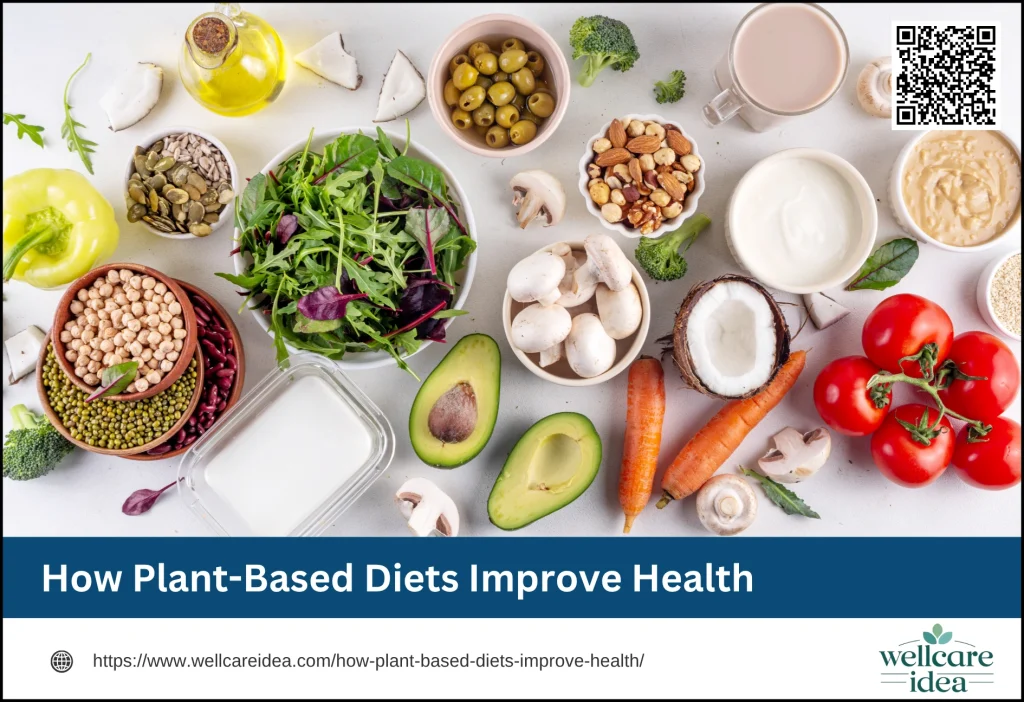In the quest for better health, many people are turning to diets that are not only effective for weight loss but also sustainable and beneficial for long-term wellness. Among the various options, plant-based diets have gained significant attention from researchers and health professionals. This dietary pattern, which emphasizes foods derived from plants, is backed by a substantial body of science showing profound benefits for the body and mind. From managing weight to protecting the heart and brain, the evidence suggests that shifting towards a plant-centric plate is a powerful strategy for enhancing overall health 1.
1. Benefits for Weight Management
Plant-based diets offer a powerful and natural approach to achieving and maintaining a healthy weight. Multiple research studies and analyses of clinical trials have consistently shown that individuals who adopt plant-based dietary patterns tend to have a lower body mass index (BMI) and experience significant weight loss. A major review of intervention trials found that plant-based diets led to an average weight loss of about 5 kilograms. The weight management advantage of a plant-based diet is linked to several factors. These diets are typically rich in fiber, which comes from vegetables, fruits, and whole grains. Fiber helps you feel full and satisfied after a meal, which naturally reduces overall calorie intake without the need for strict portion control 2. Furthermore, by focusing on whole plant foods, individuals naturally consume fewer high-calorie, ultra-processed foods, which are major contributors to weight gain 3.
2. Improved Cardiovascular Health
The heart is one of the biggest beneficiaries of a diet rich in plant foods. A large study from Harvard University that followed over 200,000 people found that those who consumed the highest ratio of plant protein to animal protein had a 19% lower risk of developing cardiovascular disease and a 27% lower risk of coronary artery disease. Plant-based diets support heart health in several ways. They are excellent for improving cholesterol levels, particularly by reducing “bad” LDL cholesterol 4, 5. They also help lower blood pressure, another critical risk factor for heart disease 6, 7. It is important to note, however, that not all plant-based diets are created equal. Research shows that a “healthful” plant-based diet—one rich in whole grains, fruits, vegetables, nuts, and legumes—is associated with the lowest risk of heart disease. On the other hand, an “unhealthful” plant-based diet that includes sugary drinks, refined grains, and processed foods does not offer the same protective benefits and may even be harmful 8
3. Optimizing Blood Sugar and Metabolic Health
For those concerned about blood sugar and metabolic conditions like type 2 diabetes, a plant-based diet can be a powerful tool. Clinical trials have demonstrated that adopting a plant-based eating pattern leads to improvements in key metabolic markers 9 Studies have recorded significant reductions in fasting blood glucose and hemoglobin A1c, a long-term measure of blood sugar control 10, 9. This is because diets centered on whole plant foods are naturally high in fiber, which helps slow the absorption of sugar into the bloodstream, preventing sharp spikes in blood sugar 2 Furthermore, the healthy fats and compounds in nuts, seeds, and legumes improve how the body uses insulin, a condition known as improved insulin resistance 9. By promoting a healthy body weight and providing nutrients that stabilize blood sugar, plant-based diets can help manage and even prevent metabolic syndrome and type 2 diabetes 9.
4. Supporting Digestive Health
A healthy gut is fundamental to overall wellness, and plant-based diets are ideally suited to promote digestive health. The foundation of this benefit is fiber, which is abundant in fruits, vegetables, legumes, and whole grains. Fiber acts as a prebiotic, serving as food for the beneficial bacteria that live in your intestines. This relationship is part of a vital communication network known as the gut-brain axis. A thriving gut microbiome, supported by a diverse intake of plant fibers, helps maintain the integrity of the digestive tract, supports regular bowel movements, and even produces compounds that benefit the rest of the body 11 Emerging science suggests that by nurturing these good gut bacteria, a plant-based diet can have positive effects that extend far beyond the gut, influencing everything from inflammation to brain function 12
5. Reducing Inflammation and Chronic Disease Risk
Chronic inflammation is like a slow-burning fire inside the body, linked to many serious diseases. Diet is a major contributor to this process, and plant-based diets are packed with foods that have natural anti-inflammatory properties. Foods that fight inflammation include tomatoes, olive oil, green leafy vegetables, nuts, fatty fish, and fruits like strawberries and oranges 13. These foods are rich in antioxidants and polyphenols—protective compounds that help neutralize free radicals and calm the inflammatory pathways in the body 14 , 15. In contrast, a diet high in ultra-processed foods, sugary beverages, and processed meats can fuel inflammation 3. By choosing an anti-inflammatory diet, such as the Mediterranean diet, you can significantly reduce your risk of chronic conditions, including heart disease, diabetes, and arthritis 14.
6. Enhancing Mental and Cognitive Health
What we eat also has a profound impact on our brains. As we age, nutrition plays a critical role in preserving memory and cognitive function. Diets rich in fruits, vegetables, nuts, and whole grains are associated with a lower risk of age-related cognitive decline and neurodegenerative diseases like Alzheimer’s . The brain-boosting power of these foods comes from the combination of antioxidant vitamins, polyphenols, and healthy fats they provide. In animal studies, these nutrients have been shown to enhance brain cell growth, improve communication between brain cells, and protect neurons from damage by reducing oxidative stress and inflammation. Specific plant foods like berries, citrus fruits, nuts, green tea, and coffee have been linked in clinical trials to improvements in cognitive functions, particularly those related to planning and focus 15 , 12.
Practical Steps to Implement a Plant-Based Diet
Transitioning to a plant-based diet does not have to be an all-or-nothing endeavor. A great first step is to focus on adding more whole plant foods to your plate rather than restricting others. As experts from Harvard suggest, “A moderate change in your diet, such as lowering your animal food intake by one to two servings per day and replacing it with legumes or nuts as your protein source, can have a lasting positive impact on your health”. Start by slowly making changes, such as swapping white bread for whole-grain bread or choosing water over sugary drinks 16. Try building your meals around vegetables, fruits, whole grains, and healthy protein sources like beans, lentils, and tofu 17 , 1. The goal is to create a sustainable lifestyle shift, focusing on the quality of the plant foods you eat and enjoying the variety of colors and flavors they bring to your meals 18.
Challenges and Considerations
While the health benefits are clear, some may find it challenging to change long-standing dietary habits. The key is to avoid feeling overwhelmed. It is not necessary to become strictly vegan or vegetarian to see health benefits. The focus should be on overall dietary pattern quality—emphasizing healthy plant foods while reducing, but not necessarily completely eliminating, animal products. Another consideration is ensuring you get enough of certain nutrients like Vitamin B12, which is primarily found in animal products. If you are moving toward a fully vegan diet, you may need to seek out fortified foods or supplements 1. For personalized advice, especially if you have pre-existing health conditions, it is always best to consult with a doctor or a registered dietitian 17, 18.
Conclusion
The scientific evidence is compelling: a diet rich in wholesome plant foods is a powerful prescription for better health. From helping to manage weight and protecting the heart to calming inflammation and sharpening the mind, the benefits of a plant-based diet touch nearly every aspect of our well-being 1. This approach to eating is not about strict rules but about making mindful, gradual shifts toward a more colorful and varied plate 17, 18. By embracing the power of plants, you can make a profound and lasting investment in your long-term health 18 , 1.

